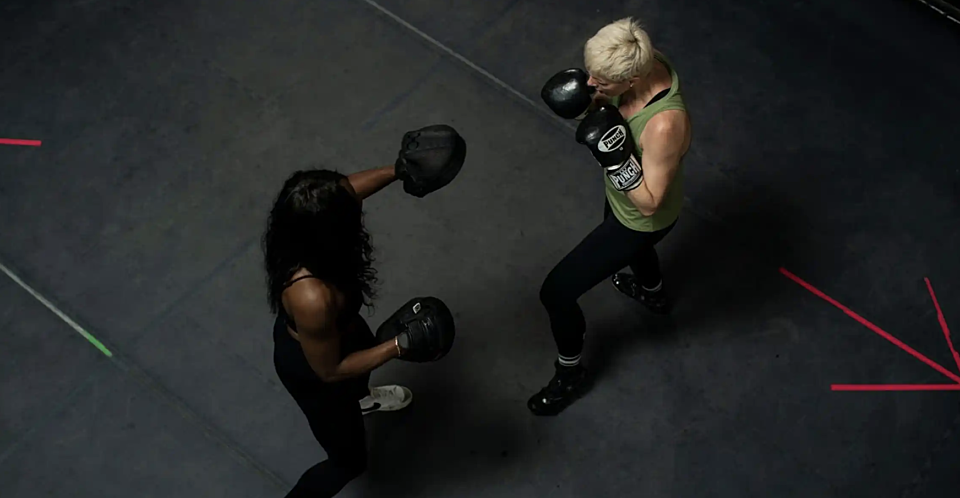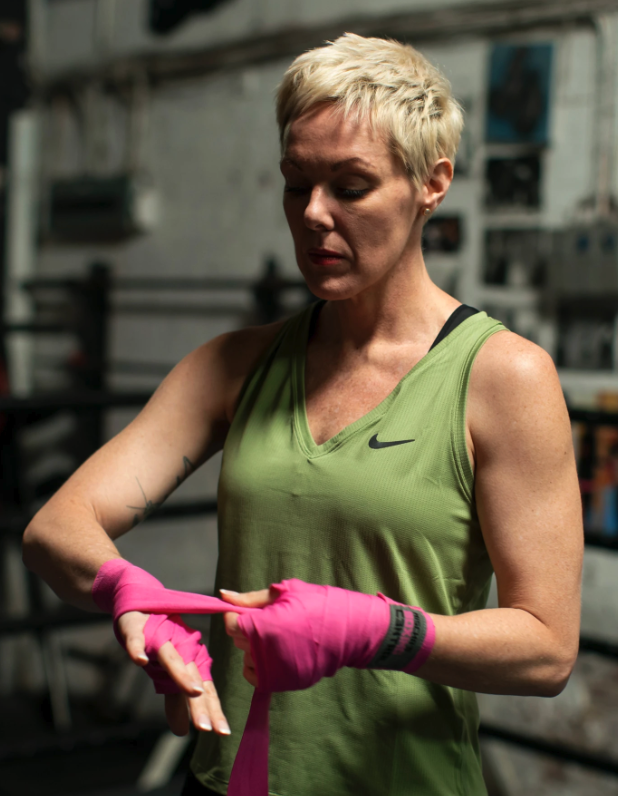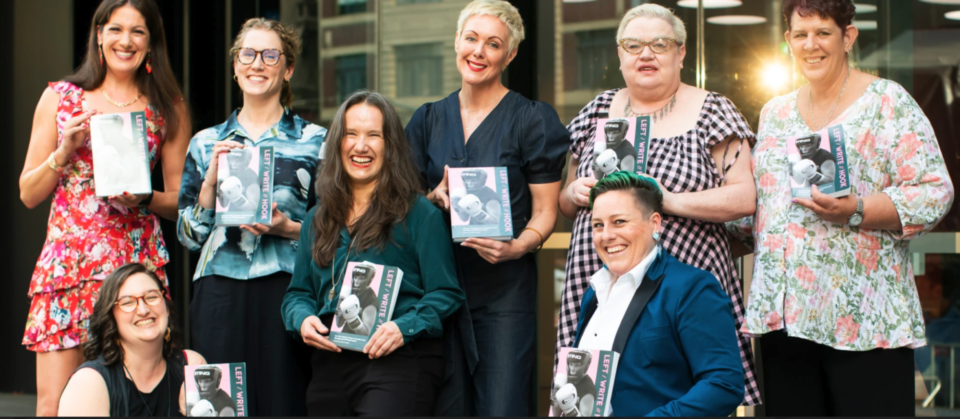
Punching through the pain of abuse
Posted on 09 Sep 2025
Left Write Hook is a charity that uses a unique blend of journal writing and boxing training to…
Posted on 09 Sep 2025
By Nick Place, journalist, Institute of Community Directors Australia

Left Write Hook is a charity that uses a unique blend of journal writing and boxing training to support victim-survivors of childhood sexual abuse and gendered violence. It was the subject of a feature-length documentary that won the audience award at the 2024 Melbourne International Film festival and is now screening on Netflix. The Community Advocate spoke to Left Write Hook’s founder, Dr Donna Lyon, in the lead-up to a live audience-participation event.
It was in 2019 that it started as a little grassroots project at my local gym.
It was born out of a desire to connect with other women like me who’d been sexually abused and were survivors. In my own recovery journey, I had found boxing as a way to process some of my stuff, and found myself in this amateur fighting world for about 18 months, and it was really fun and a wonderful way to have a goal and a mission and a purpose. But in many ways, I recognised that I wasn’t really doing it to be a competitive fighter; I was really doing it as a kind of reclamation of my body and also a processing tool for my trauma. Boxing is incredibly empowering. I loved it. I loved the training, the skill, the mindset, the practice, the repetition, the connection to my body. I just felt really strong and alive, and I didn’t want to let that experience and that feeling go to waste.

At that point in my recovery, I also realised I felt really lonely. I wanted to meet other women like me, and I wondered if maybe I could just teach boxing, but because I kind of didn’t have champion belt status, I felt a bit like a fraud. So, I thought, well, okay, maybe I don’t just do that; maybe I bring in my creative arts background. I didn’t just want to box with people, I really wanted to talk to people, and so the writing came as another idea and it felt like a juxtaposition, and it is in many ways. I put out some grassroots advertising, Facebook ads, flyers in a cafe, a bit of word of mouth. Just such down-low comms – and essentially the right people just found us.
We write in a gym to some prompts, and we share, and then we go and hit a boxing bag. But actually, it’s been an incredibly effective way to get together as a small community to bear witness and move from internal processing to external processing, through sharing and then expression on a boxing bag as a real release. It was very powerful from the beginning and palpable in that room.
I’m a filmmaker so I thought there’s a good idea in this; this could be a film. I ran a couple of workshops and invited a colleague who is a filmmaker and an academic. Then we took it to the University of Melbourne and ran an eight-week program, measuring it with a psychologist to see if the concept works from a more formal psychological standpoint. I was thinking, it seems to work in the room, but we’ll find out psychologically through research, and we’ll also film it with the intention of making a documentary, and I’d love to write a book as well, of stories from the workshop … then covid hit, a couple of weeks in, and we had to park the documentary. But the program measurement happened, even with six weeks of it online, two weeks in person, and we got incredible results – a reduction in PTSD, a reduction in depression and stress, but also increases in people’s sense of personal agency, belonging and resilience. I’d forged these incredible bonds with the people, and it was like, ‘Well, I still really want to make a documentary film, do you guys?’ And they did.
That’s where philanthropy came in, because when we pitched to philanthropy to support our social impact campaign, [the response was] “Your trailer’s amazing, it’s really powerful, but when that film comes out, people are going to want to do the program that you’ve created, Donna.” Alongside that, I was working with the University of Melbourne to consider what would it mean to do a startup? I landed on the charity model for Left Write Hook partly because I didn’t feel like you could really charge people to do a program like this.
We’ve got a “pay what you want or can” model to make it as accessible as possible and try and bring in a little bit of money to cover some basic costs. But these are people who are victim survivors, already paying, when they can afford it, hundreds of dollars each week on mental health and other physical health medical bills, because, through no fault of their own, they are fucked up on the experience of being sexually abused, which completely radically shifts your mental and physical health. I mean, there are really high-functioning people, and people on a continuum, but it catches up with you. So we set up a charity (officially registered in 2022) and since then it’s kind of had this groundswell, it’s kind of a movement, but the film went and premiered, and it’s meant that we’ve now got 700 people on a waiting list.
They want to get better. They see the value in it. It’s an integrated solution to recovery. The research shows that trauma is stored in the body, and that an effective way to process that trauma is through creativity and body-based exercises. Boxing is obviously a body-based exercise, and it’s really good when people who have lived experience lead it. We have the ingredients, but it has just been that question around how do you grow a program like Left Write Hook authentically and safely? That’s what we’re doing, and we’re doing it to the best of our ability, but it’s bloody exhausting and it’s really hard work.
“The simple combination of writing and boxing led by peers actually just works in a structured way. I think that’s cool.”

I think so. I think I’ve gained a lot of strength and confidence through leading this and being on the journey. Although it’s been rocky, I think at that time of making the film, I just don’t think I had really valued myself. I think I’ve begun to understand some of the gifts that I have, and I’m trying to be really responsible with that.
Yeah, totally. It’s cool. But the interesting thing is that as we’re doing this research trial with the University of Melbourne, it’s a randomised controlled trial where we’re comparing just straight trauma-informed boxing to Left Write Hook’s model of writing and boxing. The thing is, the Left Write Hook program still works even when I’m not running it, and that’s the point, right? Because there’s a kind of coalescence of skills and creativity that I’ve brought to the formation of it, but the simple combination of writing and boxing led by peers actually just works in a structured way. I think that’s cool.
Dr Donna Lyon, as part of the University of Melbourne’s New Humanity Makers 2025 series, is running an interactive Left Write Hook session for the general public on Tuesday, September 16, at 6.30 pm, using film, creativity and boxing to explore how survivor-led practice transforms pain into strength. Tickets are available here.
For more information about Left Write Hook, the charity, click here.
For information about the documentary, click here.
Please note: The Funding Centre launched the grant category "Domestic and Family Violence" on September 16, 2025. The team will continue to assign grants and programs under this category as they become available.

Posted on 09 Sep 2025
Left Write Hook is a charity that uses a unique blend of journal writing and boxing training to…